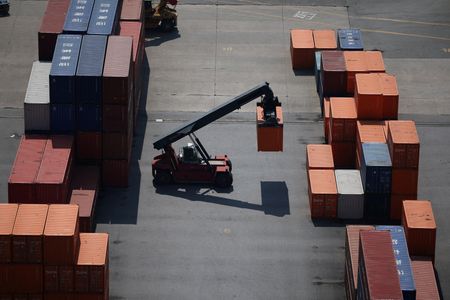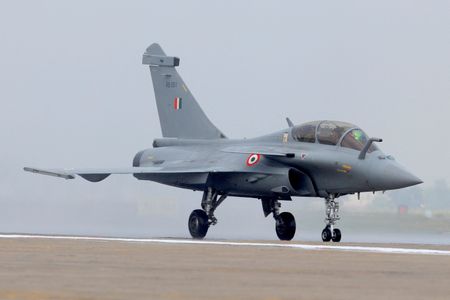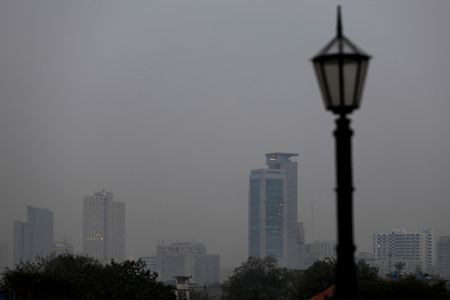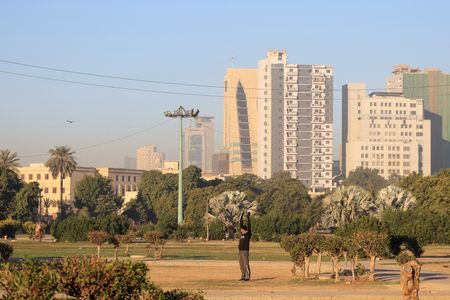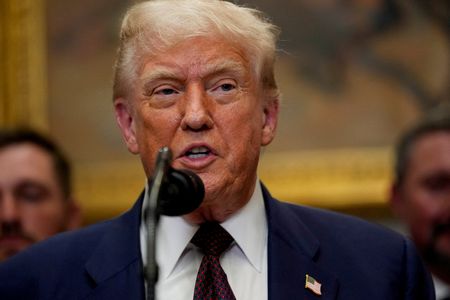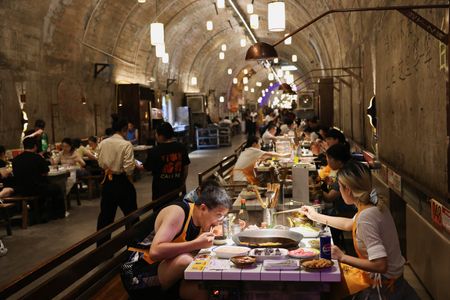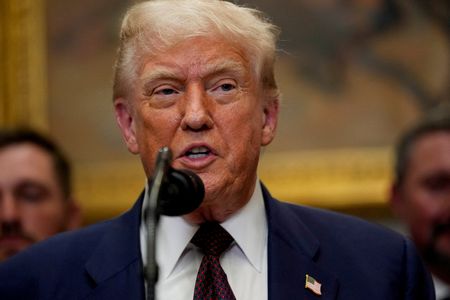SEOUL (Reuters) – When a South Korean delegation meets U.S. counterparts in Washington on Thursday for trade talks, they face a wide range of potential agenda items.
U.S. President Donald Trump has said he wants to hold “one-stop shopping” negotiations and has mentioned the trade balance, tariffs, shipbuilding, energy cooperation, and military cost sharing as issues for discussion.
Here are some of the key issues that may be discussed during the South Korea-U.S. trade talks.
TARIFFS
South Korea faces looming reciprocal tariffs, which Trump set at 25%, as well as item-specific tariffs on products such as steel, autos and semiconductors.
It will likely seek to lower the reciprocal tariff rate to the baseline 10%, but may struggle to win exemptions from the item-specific levies.
The U.S.-Korea Free Trade Agreement has reduced bilateral tariffs to 0.79% in 2024, but Washington could ask Seoul to lower remaining tariffs on some U.S. agricultural goods such as rice and fruit.
Trump could also target some non-tariff barriers such as South Korean restrictions on genetically modified foods, quarantines for agriculture products, limits on beef, and regulations on tech companies.
INVESTMENT
South Korea could offer to expand production bases in the United States via Korean companies, including in the automotive, chip and battery sectors. On March 24, Hyundai announced a $20 billion investment for U.S.-based auto and auto parts production through 2028.
The potential tariffs will likely boost back-end fabrication investment in the United States, according to Citi’s semiconductor equity research team.
PURCHASES
Trump and the U.S. acting ambassador to Seoul, Joseph Yun, have warned that South Korea must reduce its trade surplus with the United States.
South Korea is a major buyer of American military exports, including warplanes, and could look to announce more deals.
It could also boost purchases of U.S.-produced energy commodities, agricultural products, and commercial airplanes.
In March Boeing and Korean Air touted an upcoming $32.7 billion order for up to 50 widebody airplanes, plus engines and maintenance.
ENERGY
Trump wants South Korea and other Asian partners to join a $44 billion natural gas export project in Alaska.
The project aims to transport gas south from Alaska’s remote north via a 1,300-km (800-mile) pipeline, to be shipped as LNG to Japan, South Korea and Taiwan, bypassing the Panama Canal.
South Korea hosted the Alaska governor and energy officials for talks in March and officials are considering travelling soon to Alaska as part of working-level negotiations on the project.
SHIPBUILDING
South Korea has said cooperation with Washington in the shipbuilding sector is a “very important card” in negotiations.
The country’s shipyards are expected to potentially benefit from rising demand for tankers, particularly after Trump restricted use of Chinese vessels.
South Korea also has contracts for servicing some U.S. Navy ships.
Some experts have expressed scepticism, however, that South Korea has the capacity to capitalise on increasing orders.
DEFENCE COSTS
South Korea hosts about 28,500 American troops as a legacy of the 1950-1953 Korean War. It relies on the U.S. nuclear umbrella for protection against China, Russia and North Korea, and is seen as a key ally for projecting U.S. military power.
Late last year Seoul signed a new agreement under which it will pay around $1.2 billion toward the upkeep of those U.S. troops in 2026, up 8.3% from 2025.
During the campaign Trump said South Korea should pay as much as $10 billion per year, and has said such costs would be part of the negotiations.
(Reporting by Seoul bureau; Writing by Josh Smith; Editing by Shri Navaratnam)

